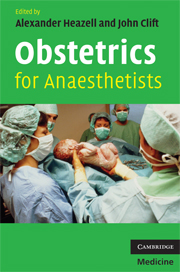Book contents
- Frontmatter
- Contents
- List of contributors
- Foreword
- Preface
- Acknowledgements
- List of abbreviations
- 1 Maternal physiology and obstetrics
- 2 Antenatal care
- 3 Induction of labour
- 4 Normal labour
- 5 Abnormal labour
- 6 Fetal monitoring
- 7 Pre-eclampsia and hypertensive disorders of pregnancy
- 8 Operative obstetrics
- 9 Obstetric haemorrhage
- 10 Thromboembolic disorders of pregnancy
- 11 Infection
- 12 Life support in obstetrics
- 13 Drugs in obstetrics
- 14 Confidential enquiries into fetal, neonatal and maternal death
- Appendix 1 Adult Advanced Life Support Algorithm
- Appendix 2 The Management of Postpartum Haemorrhage Algorithm
- Appendix 3 Emergency Management of Eclamptic Fit Algorithm
- Index
- References
14 - Confidential enquiries into fetal, neonatal and maternal death
Published online by Cambridge University Press: 21 August 2009
- Frontmatter
- Contents
- List of contributors
- Foreword
- Preface
- Acknowledgements
- List of abbreviations
- 1 Maternal physiology and obstetrics
- 2 Antenatal care
- 3 Induction of labour
- 4 Normal labour
- 5 Abnormal labour
- 6 Fetal monitoring
- 7 Pre-eclampsia and hypertensive disorders of pregnancy
- 8 Operative obstetrics
- 9 Obstetric haemorrhage
- 10 Thromboembolic disorders of pregnancy
- 11 Infection
- 12 Life support in obstetrics
- 13 Drugs in obstetrics
- 14 Confidential enquiries into fetal, neonatal and maternal death
- Appendix 1 Adult Advanced Life Support Algorithm
- Appendix 2 The Management of Postpartum Haemorrhage Algorithm
- Appendix 3 Emergency Management of Eclamptic Fit Algorithm
- Index
- References
Summary
Introduction
Until April 2003 there were two separate bodies collecting information and making enquiries into maternal and perinatal deaths in the UK. The Confidential Enquiries into Maternal Deaths (CEMD) produced triennial reports entitled “Why Mothers Die” from 1952 up to and including the report for 1997/9. The Confidential Enquiries into Stillbirths and Deaths in Infancy (CESDI) produced annual reports in addition to focused reports (e.g. Project 27/28).
These two bodies are now combined into the Confidential Enquiry into Maternal and Child Health (CEMACH). This is a self-governing body managed by its own board with members nominated by eight Royal Colleges. The remit of CEMACH includes the improvement of maternal and child health as well as mortality reviews. To this end, CEMACH has not only continued the Why Mothers Die report and the Stillbirth Neonatal and Postnatal Mortality report but also undertakes focused enquiries e.g. The Diabetes Study.
The National Institute for Health and Clinical Excellence (NICE) currently takes overall responsibility for the publishing of these reports, however this role will be short lived and is soon to be handed over to the National Patient Safety Agency (NPSA).
All maternal deaths should be reported to CEMACH Regional Manager, who then initiates an enquiry by sending a standard form to all professionals concerned with the care of the woman. The Trust must hold an internal investigation to ascertain what happened, and the Strategic Health Authorities, Primary Care Trust, coroner, and Local Supervising Authority Midwifery Officer (LSAMO) should also be informed.
Keywords
- Type
- Chapter
- Information
- Obstetrics for Anaesthetists , pp. 149 - 152Publisher: Cambridge University PressPrint publication year: 2008



